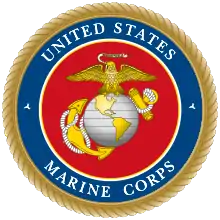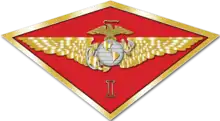VMM-363
Marine Medium Tiltrotor Squadron 363 (VMM-363) is a United States Marine Corps tiltrotor squadron consisting of MV-22B Ospreys. The squadron, known as the "Lucky Red Lions", is based at MCB Hawaii and falls under the command of Marine Aircraft Group 24 (MAG-24) and the 1st Marine Aircraft Wing.
| Marine Medium Tiltrotor Squadron 363 | |
|---|---|
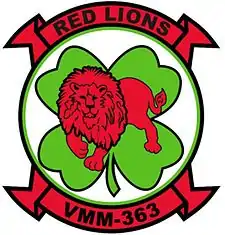 VMM-363 Unit insignia | |
| Active | June 2, 1952–present |
| Country | United States of America |
| Branch | United States Marine Corps |
| Type | Marine Medium Tiltrotor Squadron |
| Role | Assault Support |
| Part of | Marine Aircraft Group 24 1st Marine Aircraft Wing |
| Garrison/HQ | MCB Hawaii |
| Nickname(s) | Lucky Red Lions |
| Tail Code | YZ |
| Mascot(s) | Lucky the Lion |
| Engagements | Vietnam War Operation Iraqi Freedom Operation Enduring Freedom Operation Inherent Resolve |
| Commanders | |
| Current commander | LtCol E. B. Sandberg |
Mission
Provide assault support of combat troops, supplies and equipment during amphibious operations and subsequent operations ashore. Routinely, VMM squadrons provide the foundation for an aviation combat element (ACE) of any level Marine Air-Ground Task Force (MAGTF) mission that may include conventional assault support tasks and special operations.
History
Early years
Marine Medium Tiltrotor Squadron 363 the "Lucky Red Lions", was activated on June 2, 1952, at Marine Corps Air Station Santa Ana, California and was designated the Marine Helicopter Transport Squadron 363 (HMR-363). It was activated as a result of the demands of the Korean War. In 1953, the unit flew the Sikorsky HRS-1 and during this period took part in Operation Desert Rock, the first atomic test to use ground troops. Soon thereafter, the squadron became the first West Coast helicopter unit to receive the Sikorsky H-34 helicopter. In December 1964, a disastrous flood struck Northern California, and on Christmas Eve, HMM-363 deployed aboard the USS Bennington and rushed northward to the disaster area.

Vietnam War
The squadron was deployed to Vietnam in August 1965. On September 1, 1965, HMM-363 engaged in their first combat missions ever. The squadron’s initial troop insert was a combined operation with HMM-161 in moving the 3rd Battalion 3rd Marines into a landing zone south of Da Nang at Marble Mountain. Close ties between HMM-363 and Republic of Korea (ROK) forces were developed in Operation Flying Tiger. The Tiger Division was airlifted to Hill 78 in conjunction with the operation, which was viewed as the most successful Korean offensive of the war to date. The squadron was also involved with numerous operations, which increased in intensity following the Tet Offensive in early 1968. March 26, 1968 was perhaps the most disastrous day in the history of HMM-363. During a rocket attack, five squadron members were wounded and required medical evacuation. During the flight up the coast of Vietnam, the medevac aircraft lost its engine and crashed killing seven people including the commanding officer. The only survivors were the pilot and co-pilot who managed to escape before the aircraft sank in the coastal waters. On January 23, 1969, the squadron was redeployed back to California and was designated "Marine Heavy Helicopter Squadron 363" (HMH-363) after having received the Sikorsky CH-53A transport helicopter.
Post-Vietnam
In October 1972, the squadron was the first unit to receive the powerful CH-53D. In March 1977, the squadron was selected to participate in the operational evaluation of the USS Tarawa (LHA-1), the first of the new large and modern amphibious ships. In early 1983, the squadron was awarded the Meritorious Unit Citation.
The Squadron provided relief efforts and humanitarian support in the Philippines following a devastating earthquake and flood in 1990. HMH-363 flew countless missions and over 500 flight hours in 3½ weeks, delivering food, clothing, and shelter to inhabitants living in remote areas of the Philippines. The squadron received the Humanitarian Service Medal for its relief effort.

During Desert Shield/Desert Storm, HMH-363 supported the 1st Marine Aircraft Wing in Okinawa and returned to California in May 1991, terminating its unit rotations to Okinawa after this eleven-month deployment. In December 1992, the squadron participated in Operation Restore Hope in Somalia[1] and was awarded the Joint Meritorious Unit Commendation and Armed Forces Expeditionary Medal. The squadron has also supported Joint Task Force Six at Fort Bliss, Texas. During August 1996, the Red Lions relocated to Marine Corps Air Facility Kaneohe Bay and were reassigned to 1st Marine Aircraft Wing.
Global War on Terror
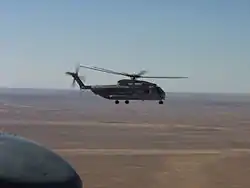
From late 2006 to early 2007, HMH-363 deployed to Iraq in support of Operation Iraqi Freedom. Based at Al Asad, this was the unit's first deployment in support of the Global War on Terror[2][3] During Operation Iraqi Freedom HMH-363 flew 848.8 hours in one month. The squadron deployed again to Al Asad in Summer 2008 to support Operation Iraqi Freedom. They returned to MCB Hawaii in February 2009.
HMH-363 was deactivated on 10 May 2012 at Marine Corps Base Kaneohe Bay, Hawaii. The squadron was then re-designated VMM-363 and activated as an MV-22B Osprey Squadron aboard Marine Corps Air Station Miramar as part of Marine Aircraft Group 16, 3rd Marine Aircraft Wing. Upon activating in 3rd MAW VMM-363 would go on to serve three combat deployments in the Central Command Area of Responsibility before moving back to its roots in MCB Hawaii.
.jpg.webp)
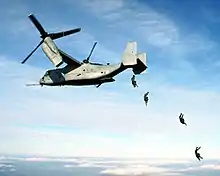
See also
Notes
- During Operation Iraqi Freedom HMH-363 flew 848.8 hours in one month.
References
 This article incorporates public domain material from websites or documents of the United States Marine Corps.
This article incorporates public domain material from websites or documents of the United States Marine Corps.
Citations
- Simmons (2003), p.320.
- "Delta squadrons exchange aircraft as mission turnover draws near". Marine Corps News. U.S. Marine Corps.
- "HMH-363 assumes role of assault support in Iraq". Marine Corps News. U.S. Marine Corps.
Bibliography
- Simmons, Edwin H. (2003). The United States Marines: A History, Fourth Edition. Annapolis, Maryland: Naval Institute Press. ISBN 1-59114-790-5.
External links
![]() Media related to Marine Heavy Helicopter Squadron 363 at Wikimedia Commons
Media related to Marine Heavy Helicopter Squadron 363 at Wikimedia Commons
